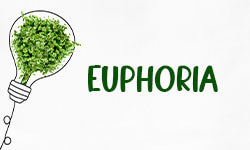
The English language has a plethora of words, terms, and phrases that people often search for definitions. Even though many of them are commonly used, people are often unaware of their true meaning and origin and simply use them to enhance their language style. This article aims to provide a comprehensive understanding of the word “euphoria”, including its origin and correct spelling.
Definition of “euphoria”
“Euphoria” is a term derived from the Greek word “euphoros,” which translates to “bearing well.” In English, euphoria is used to describe an intense feeling of happiness, joy, or excitement. This feeling can sometimes be so strong that it feels almost overwhelming or transcendent.
Use of “euphoria” in a sentence
When used in an English context, “euphoria” acts as a noun, so in a sentence, it can function in several ways, such as a subject, an object, or a complement. In terms of modifiers, “euphoria” can be used with adjectives to further describe the intensity or nature of the euphoria. The word is commonly used with “of” when specifying the source of the euphoria. It can also be used with “from” or “after” to refer to the cause. The following examples illustrate how to use this from the Greek-derived word.
How to spell “euphoria” correctly
“Euphoria” is often misspelled as “euphorea”. The only correct way of spelling the word is “euphoria.” It always consists of two parts:
- “Eu-” is a prefix that means “well” or “good.”
- “-phoros” comes from the Greek verb “pherein” which means “to bear” or “to carry.”
Correct spelling
euphoria
Wrong spelling
euphorea
euphoriaa
euforia
Synonyms for “euphoria”
Synonyms for the word “euphoria” may give a better understanding of using the word in an English context. The table illustrates synonyms for “euphoria” with respective example sentences.
| Synonym | Example |
| Bliss | Lying on the beach on a sunny day, she was enveloped by a feeling of euphoria. |
| Lying on the beach on a sunny day, she was enveloped by a feeling of bliss. | |
| Ecstasy | The news of her acceptance to her dream university sent her into a state of euphoria. |
| The news of her acceptance to her dream university sent her into a state of ecstasy. | |
| Elatedness | Winning the chess championship filled him with a sense of euphoria. |
| Winning the chess championship filled him with a sense of elatedness. | |
| Exhilaration | The euphoria of finally completing the marathon was indescribable. |
| The exhilaration of finally completing the marathon was indescribable. |
FAQs
“Euphoria” is a term used to describe a state of intense happiness, joy, or excitement. It signifies a feeling of well-being that is beyond the ordinary and can sometimes be so strong that it feels almost overwhelming.
While both terms refer to positive emotional states, euphoria is generally considered to be more intense. It is a peak experience of joy or delight, often transient, that goes beyond typical feelings of happiness.
In a sentence, the term “euphoria” refers to a state of extreme happiness, joy, or excitement. It usually signifies an emotional high or a peak experience. Here are a couple of examples:
- After completing the marathon, she was filled with a sense of euphoria.
- The euphoria of his graduation day was something he would never forget.
The term “euphoria” originates from the Greek word “euphoros,” which means “bearing well.” This term is comprised of two parts:
- “eu-” which means “good” or “well”
- “-phoros,” which means “to bear” or “carry”
- ✓ 3D live preview of your individual configuration
- ✓ Free express delivery for every single purchase
- ✓ Top-notch bindings with customised embossing

